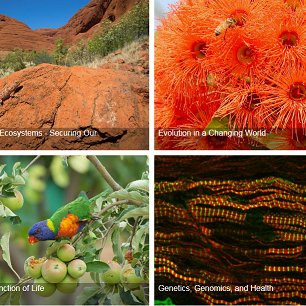
Sridevi Sureshkumar
@GATCLab
Followers
142
Following
551
Media
0
Statuses
173
Academic working at Monash University, Melbourne, Australia @ Max-Planck # triplet repeat expansions, # gene regulation, Arabidopsis. #Mom
Melbourne
Joined April 2019
Monash news release on our work!
Monash scientists have decoded how genetic mutations disrupt mRNA, a discovery that could revolutionise treatment for rare & life-threatening diseases.“This is a clear pathway to a cure,”Prof. Sureshkumar Balasubramanian Read: https://t.co/cQMOSCRRPM
#MonashScience #mRNA
0
5
16
https://t.co/fxnA1T7NYN "Dispersed components drive temperature sensing and response in plants" ...an interesting concept in temperature sensing by plants in this "Science" review. Thanks, Suresh, Sridevi and Avilash @NIPGRsocial @DBTIndia
science.org
Plants are highly sensitive to temperature, and climate change is predicted to have negative impacts on agricultural productivity. Warming temperatures, coupled with a growing population, present a...
18
18
122
NYT covers the temperature special issue from @ScienceMagazine including our article on temperature sensing and response @GATCLab @alokksinha @MonashBiol
https://t.co/SX1AvLcAdO
nytimes.com
Genetically altering crops may be key to helping them adapt to extreme temperatures. But shrinking funds and social acceptance stand in the way.
0
3
7
Plants don’t use a single “thermometer” to sense heat – they decode it through a molecular network! A new review led by @MonashUni biologists could reshape how we engineer climate-resilient crops using AI & synthetic biology. https://t.co/tyPHvDCqdV
#MonashScience
0
9
11
As the world warms, plants in natural ecosystems and agricultural settings find ways to respond to the heat. In a new special issue of Science, researchers examine how heat affects plants at multiple scales, from the molecular level to the biosphere. https://t.co/sTaMQJHNcX
19
86
290
Check out our (@Morpholosophist, @GATCLab and Alok Sinha ) thoughts on temperature sensing and response in plants out now @ScienceMagazine @MonashUni @MonashBiol @Monash_Science (1/4)
science.org
Plants are highly sensitive to temperature, and climate change is predicted to have negative impacts on agricultural productivity. Warming temperatures, coupled with a growing population, present a...
6
8
30
Our review with @SKBLab @GATCLab and Alok Sinha on plant temperature sensing is now in Science ( https://t.co/Kx59fyhM5Z). Special thanks to @weillinstitute @RoederLab and my alma mater @MonashUni @Monashbio (1/2).
science.org
Plants are highly sensitive to temperature, and climate change is predicted to have negative impacts on agricultural productivity. Warming temperatures, coupled with a growing population, present a...
4
10
40
Simple sequence repeats and their expansions: role in plant development, environmental response and adaptation 📖 https://t.co/4UJ9a17DPS
#TansleyReview by Sureshkumar et al. @SKBLab, @GATClab #PlantScience
0
5
12
What do we know about DNA repeats? @GATCLab @sridevisureshku and colleagues emphasise the underexplored nature and immense potential of this area of research, particularly in plants https://t.co/QGgrnoyfJE
0
4
7
Latest paper led by our collaborator Alex Fournier-Level from @UniMelb with @GATCLab & @SKBLab from @MonashBiol on trans generational memory of thermal responses in plants. https://t.co/7LW62kCW38
nph.onlinelibrary.wiley.com
Temperatures perceived early in the life cycle of mother plants can affect the germination of the offspring seeds. In Arabidopsis thaliana, vernalisation-insensitive mutants showed altered germinat...
0
4
8
Hello friends, I am making a movie for the start of #ICAR2025 in Ghent next year! I need your help to make it a community project! Please retweet + comment your favorite Arabidopsis live imaging video to be featured in the movie. Anything from macro to single-molecule, tell me!
15
143
340
I'm thrilled to announce the complete program for #ICAR2024SanDiego! 👉🏽Please check out the amazing line of up over 300 speakers in nearly 50 sessions! I hope to see you soon in San Diego.. https://t.co/AFa9qcvHfo
0
23
44
Very nice story from my friend Jia-Wei Wang’s lab!! Reciprocal conversion between annual and polycarpic perennial flowering behavior in the Brassicaceae: Cell
cell.com
Dosage of three FLC-like MADS-box genes in polycarpic perennials, which are long-lived plants that can flower multiple times before dying, ensures the maintenance of meristems needed for perenniality...
0
3
8
Post-translational modifiers are involved in the responses of plants to various environmental stimuli and a new study by @@GATCLab highlights the importance of post-translational modifiers and histone readers in epigenetic silencing.
nature.com
Nature Plants - Repeat expansions can induce gene silencing exemplified by growth defects in plants to genetic diseases in humans. This paper shows key roles for post-translational modifiers,...
0
1
1
Have you ever noticed how the academy's power dynamics can be insane? It's a topic that's been on my mind lately. Do you think there's a better model out there to help improve or even curb these dynamics? I'd love to hear your thoughts!
0
0
0
Check out our recent story highlighted in @Nature ! "How to freeze a memory" https://t.co/jj5LhxAhA7
18
82
445
New Letter: "SUMO protease FUG1, histone reader AL3 and chromodomain protein LHP1 are integral to repeat expansion-induced gene silencing in Arabidopsis thaliana" https://t.co/d7BiiOZPcE With associated Research Briefing: https://t.co/ZvM4RXfG8u
0
15
42
Happy to have helped with quantifying nuclear localisation accurately. @HarrisonMYork from our lab used FLIM (@LeicaMicro) at @MIPS_Australia to discard autofluorescence, abundant in plant cells, and pick GFP signals.
We deciphered a novel genetic pathway underlying trinucleotide repeat-mediated gene silencing, published today in Nature Plants. Thanks to my team @MonashBiol and collaborators @SKBLab @sadanandomlab, Ram Yadhv, Hong Toa, Emmanuel, and @cellphylab. https://t.co/1zVcwLp19d
0
6
20
A research briefing accompanying the article from @GATCLab providing a summary of the paper as well as behind the paper and expert & editors opinion.
nature.com
Nature Plants - A triplet repeat expansion in Arabidopsis induces gene silencing that results in a severe growth defect. We show that an interplay between a SUMO protease and histone readers of...
0
4
11
By midnight Monday 22 April (Pacific time USA) extended deadline to submit an abstract for a talk at #ICAR2024SanDiego! You can submit to all sessions but sessions looking especially to expand their abstract submissions are listed below: https://t.co/FrMAk16JPT
1
5
7
















